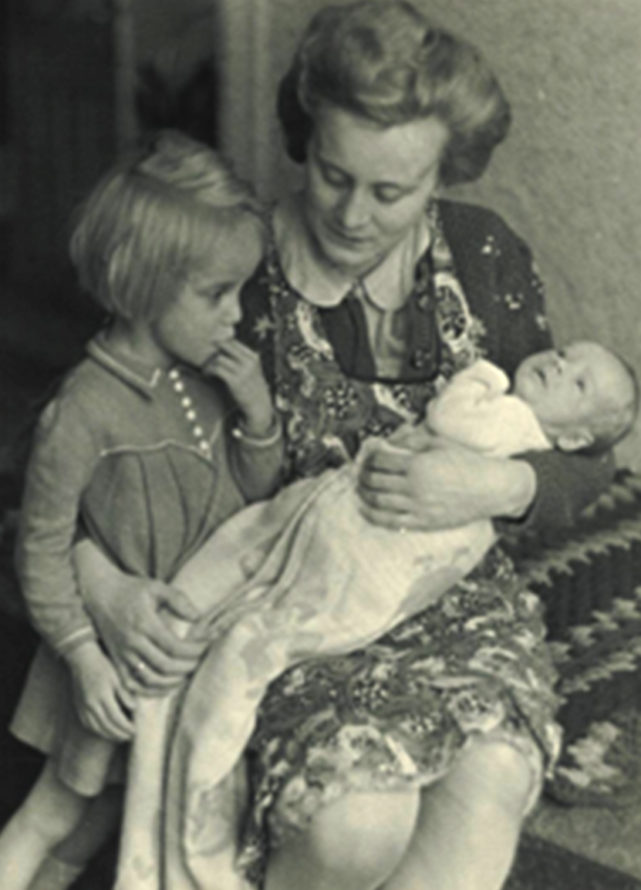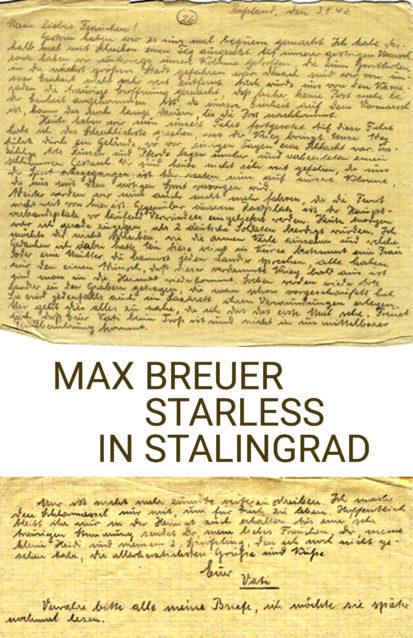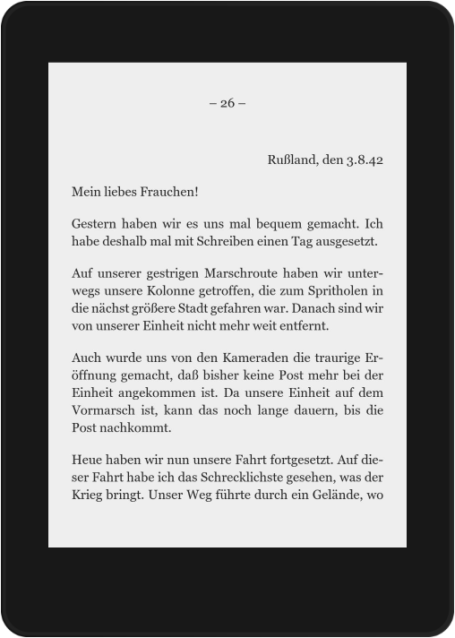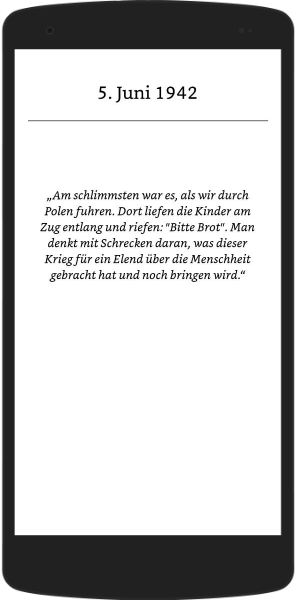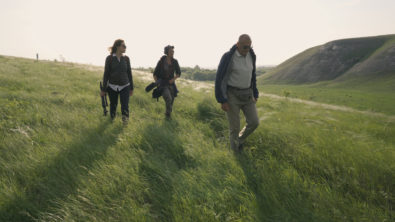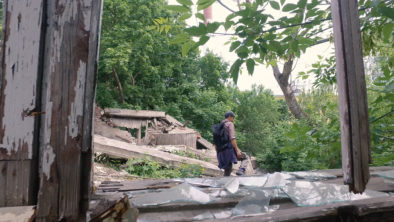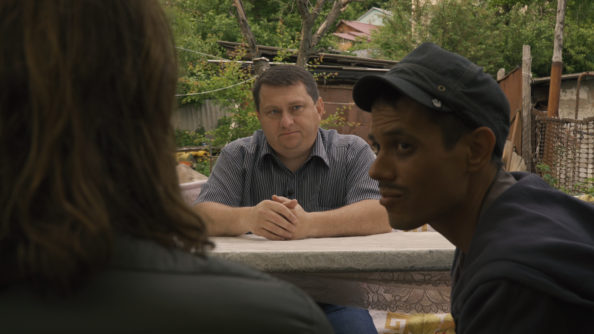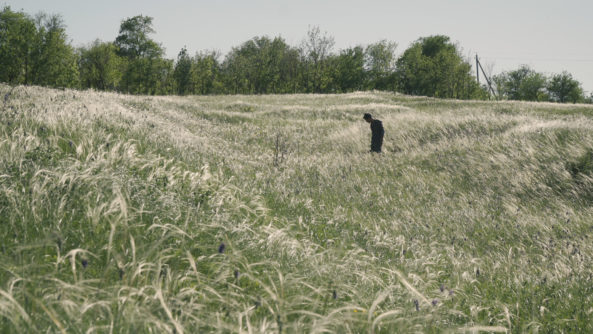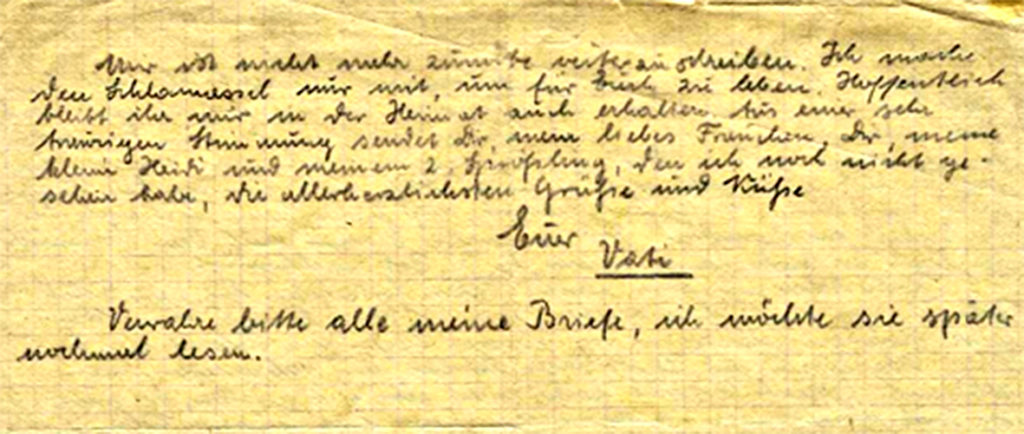

STARLESS IN STALINGRAD
is a multimedia documentary project
by Ascan Breuer.
Story
STARLESS IN STALINGRAD is based on approximately one hundred letters Ascan Breuer’s grandfather had sent from Russia to his wife in Hamburg, Germany, within seven months (from June 5, 1942 to January 5, 1943).
After being inducted to military service Ascan’s grandfather kept contacting his wife almost daily reporting from his journey as a soldier of the Wehrmacht which in the course of the offensive warfare lead him over 1500 kilometers from Babruysk (Belarus) to Stalingrad (today’s Volgograd).
Meanwhile, his wife – the receiver of the letters – being heavily pregnant with her husband’s child, i.e. Ascan’s father, was waiting for him in Hamburg where the bombing was just about to start…
For more details see „Summary“ and „Quotes“ below.
The sender & the Addressee:
STEP 1: #REALTIMETRAVEL
All the letters have been released online starting from June 5, 2017 to January 5, 2018 — each of them to the day exactly 75 years after their posting.
The journey was watched by 7500 followers in realtime on Facebook/StarlessInStalingrad as well as on the Web-Blog StarlessInStalingrad.com.
By January 2018 all the letters were provided for the public in an online archive.
Through the #realtimetravel (German: #Echtzeitreise) in the social media a general public has become keen on the project, via TV and newspapers, in Austria, Germany, and Russia.
STEP 2: CROWDFUNDING
In order to fund investigation on site, a crowdfunding initiative was established in cooperation with the social media-community in mid-December 2017, and successfully completed in mid-February 2018.
STEP 3: EXPEDITION TO RUSSIA
In May and June 2018 investigation was conducted in the area between Kursk and Volgograd which was sponsored by the crowdfunding as well as by the Austrian Federal Chancellery, the cultural department of the municipality of the city of Vienna, the Austrian Zukunftsfonds und the Austrian Cultural Forum in Moscow.
Places from where the letters were posted:
In case you don ́t see the map, click here.
STEP 4: PHOTO BLOG
Starting from December 2018 the communities of the website, of Facebook and Instagram are being invited to view the results of the expedition via a photo blog revealing day after day of the expedition.
Trailer of the photo blog:
STEP 5: E-BOOK
After finishing the #realtimtravel in early 2018 the letters are still available online, and, in addition, are also purchased as ebook (at Amazon, Thalia, and others).
STEP 6: DEVELOPING CINEMATIC FORMATS
Based on the research, and taking a creative ‚sideway‘ by using the photo blog in social media (see above), concepts are being developed to create cinematic formats that will also involve web series.
For this reason Ascan Breuer has been invited to participate at Berlinale Talent 2019.
SUMMARY – 100 LETTERS…
As a basic conscript of the Wehrmacht’s „6th Army“, Max Breuer wrote one hundred letters to his wife back home in Hamburg. Those letters range from the very first moment of the German offensive in Russia in the summer of 1942 to the disastrous defeat in the so-called „Stalingrad Cauldron“ seven month later. The Battle of Stalingrad is commonly considered as „the largest and bloodiest battle in the history of warfare.“ (according to Wikipedia)
Within a span of about 200 days he keeps updating her with the latest news, touching on a variety of topics, honestly revealing his innermost vibe. Already in his first letter he doesn ́t refrain from sharing with her his gloomy impressions of the so-called Bloodlands:
„The worst part of it was when we were travelling through Poland. There were children running along the train shouting: „Bitte Brot!“ (German: „Bread, please!“). You regard the fact with horror how much misery this dreadful war has brought about to mankind, and will continue to do so! And now the day when you will give birth is approaching rapidly. What bothers me most is to know that with all the chores that need to be done now you ́ll be all on your own.“ – June 5, 1942
Max Breuer ́s letters start with his arrival in Russia (in early June, 1942) reporting continuously on the Battle of Stalingrad (starting from late August 1942) and the encirclement of the sixth army (starting from end of November 1942) until shortly before the incursion of the Red Army into the „Stalingrad Cauldron“ (early in January of 1943).
In his letters Breuer depicts his experiences in a detailed, intimate, and unconcealed way, sometimes with sarcasm, sometimes naive, telling about his observations as a conscript (later private) at the eastern front. He also tells about his feelings, his grievance, hopes and wishes revolving mostly around the upcoming birth of his second child which, along with the fate of his family at large, he considers with great worry and uncertainty knowing that the bomb war in the Hanseatic city has just begun.
„What a pity to think that our (newborn) Kai will have to be a soldier, too! Hopefully, twenty years from now the world will be a bit more peaceful. I ́m wondering that they have attested Toni to be fit for service despite of his flat feet. But we need canon fodder.“ – September 11, 1942
Note: Instead of „fit for service“ the original term used in the letter is „k. v.“ meaning „kriegsverwendungsfähig“ = „employable for war“.
In the city of Voronezh he witnesses the deportation of Jews from Hungary:
„Here it’s overrun with Hungarians (German allied). Interestingly, they ́ve brought along all their Jews form Hungary who are being used for road building. The Jews are wearing plain clothes and a yellow armband. As I could observe the life of those Jews isn’t a bed of roses. We’ve supplied some of them with water when immediately all of them came running up. And, instantly, the Hungarian headman appeared chasing them away by a stick.“ – July 20, 1942
Occasionally Breuer also takes a critical view of his comrades as in this letter:
„You might be interested to hear something about comradeship. Well, that ́s a thing that is anywhere but in the Wehrmacht. As the saying goes the ‚comrade’ died in the war of 1914 to 1918. You should have seen the brothers blowing away the last hen and geese of the Russians in a drive-by shooting. Today, I’m completely sick of this damn war once again. As we ́re still moving southward, we are likely to reach the Black Sea.“ – August 1, 1942
Finally, Breuer will have to share the fate of those millions of victims of the war in Eastern Europe. At Christmas, he writes to his wife out of the Stalingrad Cauldron:
„Of hunger my head is dizzy permanently. Getting half a bread for four days, you ́re really struggling to resist temptation, so usually you ́ll find yourself gorging on it on the first two days.“ – December 27, 1942
QUOTES
All letters were released to the German-speaking public in the blog StarlessInStalingrad.com. They can be downloaded as ebook, too.
June 5, 1942 – first letter
Last night we reached our goal after six full days. This part of the country is dead and bleak. The worst part of it was when we were traveling through Poland. There were children running along the train shouting „Bitte, Brot!“ (German: „Bread, please!“). You regard the fact with horror how much misery this dreadful war has brought about to mankind, and will continue to do so.
July 12, 1942
You can ́t imagine the poor habitation of those people here. Their dwellings are simple strawhuts, halfway gone to rack, and in between you can see people in torn clothes almost starved to death. All over the fields and in the woods wild looking children are running around seemingly having lost their parents and homes.
August 1, 1942
After a whole day´s driving on these Russian roads – mostly cartways woaked by tanks with uncounable potholes – you feel like broken on the wheel (German: „gerädert“) at night. The streets are lined with perished horses. Sometimes you feel disgust to see those corpses eaten up by flies and worms which also stink up terribly.
August 3, 1942
Today we have continued our ride. On this way I faced the most horrible that war could bring along. Our way led us through an area where a battle had taken place a few days back. Countless dead Russians and horses were lying around emitting a disgusting stench. This morning I happened to witness the burial of two German soldiers. I really don ́t want to describe to you the poor guys’ appearances, nor tell you what kind of feelings had taken hold of me. Talk to any of the Landser (German infanterist in WW2, coll./hist./self-referential)— all of them share their only desire for this damn war to be over soon so they can go back home again. Just now again they ́re carrying dead Landser to the graves they have digged in advance. I ́m not in the mood any longer to continue writing. I ́m going on with this mess (original: „Schlamassel“, German/Yiddish) only to continue living for you and the kids. Hopefully you also will survive for me back home…
August 3, 1942
…The letter which I wrote to you just this morning has probably saddened you. I was subject to a momentary mood, and I made the mistake to disclose it to you. But you don ́t have to worry about me at all. As you know I ́m an army beginner that ́s why (the sight of) so many dead people made such a deep impact on me. But over time one becomes hardened as a matter of routine. Once I will be home again I will have changed a lot.
September 1, 1942
Today we ́re entering into the fourth year of war, so the old Chamberlain was right since the beginning of the war when he declared that this war at least will last for three to four years. And the next year of war will be completed as well. (…) The Russians (original: „der Russe“, sing.) are persistent foes with lots of resources available. As you know I didn ́t have such a rose-colored perspective on this war from the very beginning.
September 11, 1942
I have the firm conviction that I will come back. After the war I want none of Russia and the damn war any more. It ́s just a pity that our Kai (new-born son) will also have to be a soldier one day. Hopefully, twenty years from now the world will be a bit more peaceful. (Our friend) Toni will also be in Russia by now. I ́m wondering that they have attested him to be fit for service (original: “k.v.”, see above) despite of his flat feet. But we need canon fodder. Physical handicaps don ́t matter any more. Franzl is also in the east now. When he wrote his letter I had come already further than passing the Don. Chances are that he’s quite near by and we don ́t know it. I got a card from Günther, too. He and his brother should be happy that they ́ll not be drafted any more. I ́d really prefer to lathe granades at home (like they do) rather than going on with this gipsy life here in Russia…
October 24, 1942
As much as I am opposing all of this war I have to say it’s nevertheless interesting to view such an (air) strike from a distance…
WE DO DOC
DIFFERENTLY



